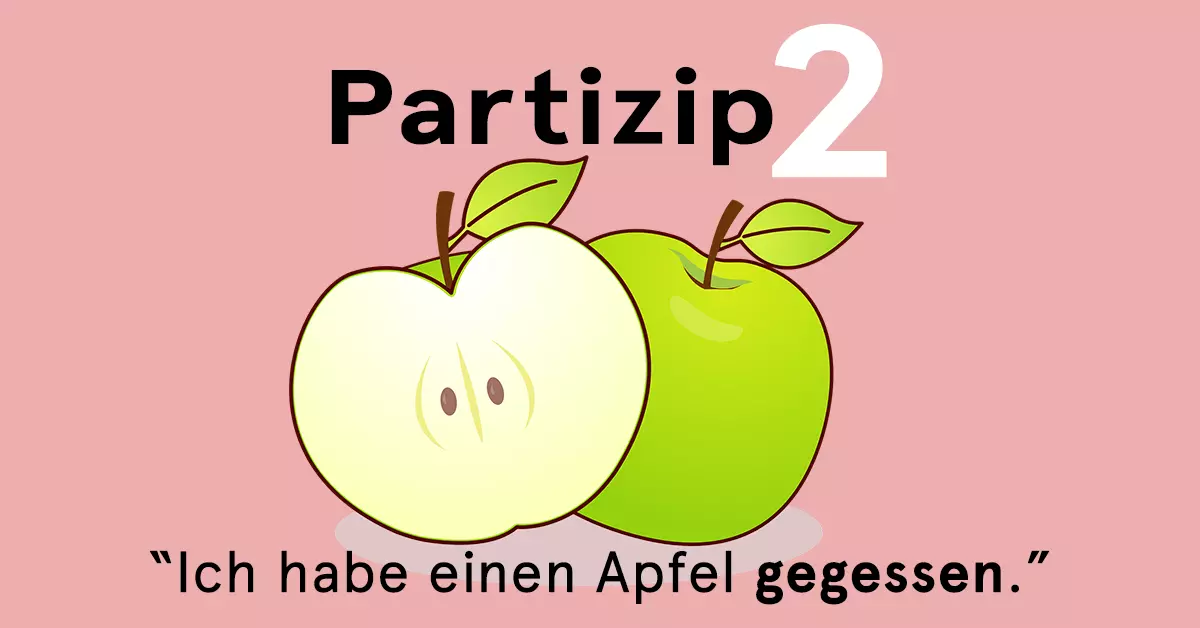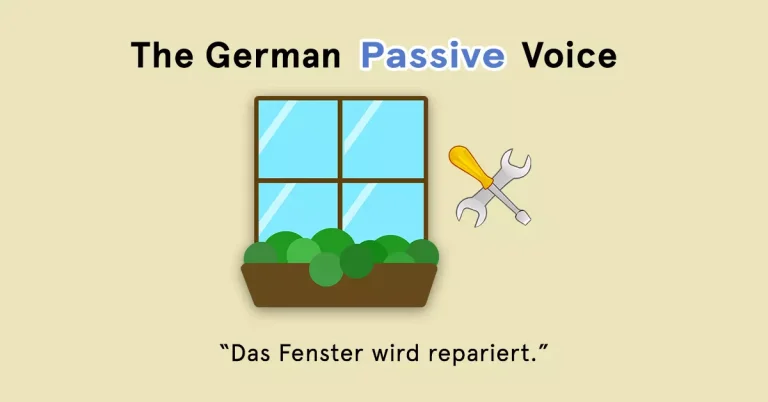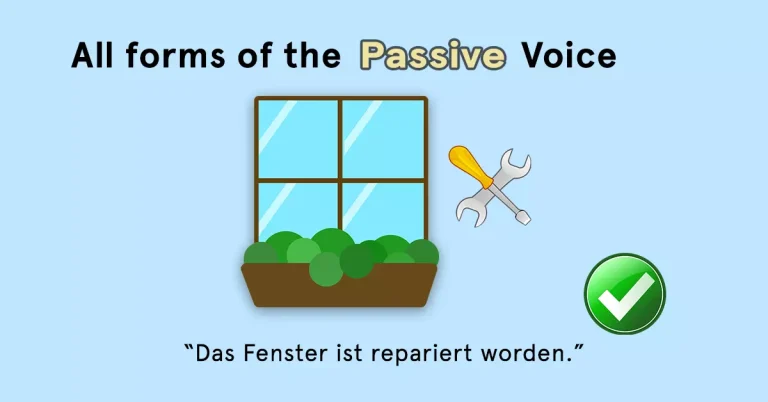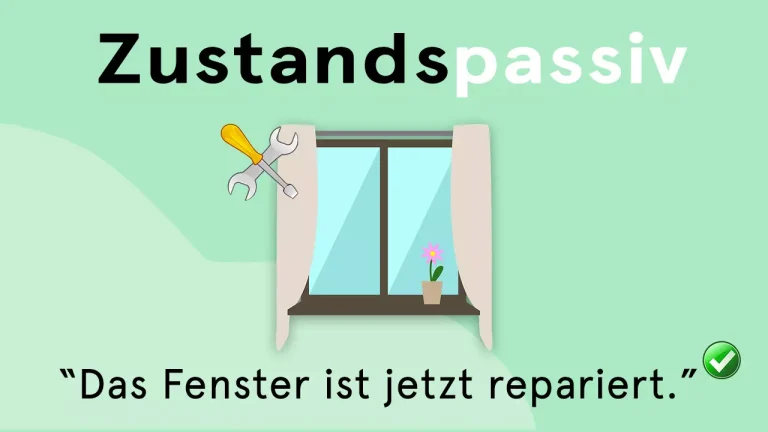In this article, you will find everything need to know about the German Partizip 2: its usage (Perfekt, passive and as an adjective), how it’s formed and the most important irregular forms.
I’m sure you’ve heard of the Partizip 2! This words comes up a lot in every German class and course book. Most importantly, you need it to form sentences in the past tense. In this article, you will learn how to form and use the Partizip 2.

The English equivalent is the past participle: done, driven, gone, repaired are some examples.
Usage: 3 main functions of the Partizip 2

Perfekt
By combining a Partizip 2 form with the auxiliary “haben” (or at times “sein”) you will get the German Perfekt tense, the most common past tense: It is the form that we use in spoken German with almost all verbs. In its form is very similar to the English present perfect (The child has done …).
*Perfekt tense:
(1) Das Kind hat seine Hausaufgaben gemacht.
The child did (or: has done) his homework.
*There is also the Plusquamperfekt (Das Kind hatte … gemacht.) and the Konjunktiv 2 of the past (Das Kind hätte … gemacht.).
Passiv
By combining these past participle forms with auxiliary “werden” you can make use of the passive voice in German. This type of passive form is called the Handlungspassiv. Please note that there is a second type of passive voice: the Zustandspassiv (“sein” +Partizip 2).
Passiv:
(2) Das Fenster wird repariert.
The window is repaired (every now and then). / The window is being repaired (right now).
In front of nouns (as adjectives)
There is a third function: You can also use Partizip 2 forms as adjectives, i.e. in front of nouns. In example (3) we have the adjective schwierig with the adjective ending (“er” in this case). Instead of a “normal” adjective, we can use a Partizip 2 form (4) , much like in English, to give more information about the noun. Note that these forms need the same endings (according the Adjektivdeklination), just like “normal” adjectives (“er” in this case).
(3) ein schwieriger Text
a difficult text
(4) ein geschriebener Text
a written text
Regular Partizip 2 forms
The regular verbs, in German they are also called “weak verbs” (schwache Verben). With those all you need to do is take the stem (infinitive minus “en”) and add “ge” to the beginning and a “t” to the end:

More examples:
spielen -> gespielt
lachen -> gelacht
kochen -> gekocht
warten -> gewartet*
*If the verb stem ends with -t, or -d, you have to add “et” instead of just the “t”. E.g.: warten -> gewartet
Partizip 2 forms of separable verbs
Separable verbs have prefixes that get separated from the verbs in main clauses (e.g. Ich rufe dich an. / I call you.). With these verbs the “ge” doesn’t appear at the beginning of the Partizip 2 form, but right after the prefix. You need a “t” again at the end for regular verbs*.

More examples:
aufwachen -> aufgewacht
einpacken -> eingepackt
mitspielen -> mitgespielt
aufmachen -> aufgemacht
zumachen -> zugemacht
*Please note: Separable verbs can also be irregular. More on this later.
Partizip 2 forms verbs with inseparable prefixes
There are also verbs with prefixes that are not separable. These verbs do not have “ge” in their past participle forms at all. The prefixes that are never separable are:
ver-, ge-, er-, be-, ent-, miss-, zer-, emp-
begrüßen -> begrüßt (not: *begegrüßt!)
vermissen -> vermisst
gewinnen -> *gewonnen*
*This is the first irregular past participle form in the article. More in this later.
Verbs that end in “ieren”
Just like verbs in the last section (prefix verbs, but not separable), the verbs that end in “ieren” do not have “ge” in their Partizip 2 forms either. They always get a “t” at the end.
reparieren -> repariert (not: *gerepariert!)
studieren -> studiert
informieren -> informiert
BTW: These words are often Latinates (words derived from Latin or from a Romance language) that are often very similar in other languages you might now (e.g. English).
Irregular Partizip 2 forms
Irregular Partizip 2 forms (starke Verben, i.e. “strong verbs”) do not end in a “t” and/or change their vowel(s) and/or change their stem completely. They simply don’t follow the rules we’ve seen in the article thus far. They have to be memorized by heart (just like in English) and it’s good practice to always try to learn new verbs together with their past participle form. Here are some very important irregular forms:
essen -> gegessen
trinken -> getrunken
schreiben -> geschrieben
kommen -> gekommen
fahren -> gefahren
Tips for the irregular verbs
I know that this can look a bit intimidating. Here are some tips that will speed up your progress immediately:
- Look for patterns: e.g. singen, sang gesungen & finden, fand gefunden
You can see the same vowel changes here (i -> a -> u), sometimes even in English (cf. sing, sang, sung)! “Sang” and “fand” are Präteritum forms, the other German past tense which is used with some verbs and in formal/literary German. - Learn one verb, know 20!
kommen, gekommen & ankommen, angekommen (separable)
finden, gefunden & erfinden, erfunden (not separable)
With these verbs (with prefixes) the stem and the ending of the Partizip 2 form will be the same as in their counterpart without the prefix. With or without “ge”? This depends on whether it’s a seprable verb or not (cf. above). - ei -> ie….en
The verbs that have “ei” in their infinitive often reverse these two vowels to “ie” and get “en” at the end: e.g. schreiben, geschrieben – bleiben, geblieben – leihen, geliehen
Most important irregular Partizip 2 forms (list)
I have included the Präteritum forms here as well.
| Infinitive form | Stem Change present tense | English translation | Präteritum form | Partizip 2 +auxiliary |
| backen | (a -> ä) | bake | backte, (buk) | hat gebacken |
| befehlen | e -> ie | command, order | befahl | hat befohlen |
| beginnen | begin | begann | hat begonnen | |
| beißen | bite | biss | hat gebissen | |
| bieten | offer | bot | hat geboten | |
| bitten | ask for, request | bat | hat gebeten | |
| braten | a -> ä | fry | briet | hat gebraten |
| brennen | burn | brannte | hat gebrannt | |
| bringen | bring | brachte | hat gebacht | |
| denken | think | dachte | hat gedacht | |
| empfehlen | e -> ie | recommend | empfahl | hat empfohlen |
| essen | e -> i | eat | aß | hat gegessen |
| fahren | a -> ä | drive; go | fuhr | ist gefahren |
| fangen | a -> ä | catch | fing | hat gefangen |
| fliegen | fly | flog | ist geflogen | |
| geben | e -> i | give | gab | hat gegeben |
| gehen | go | ging | ist gegangen | |
| genießen | enjoy | genoss | hat genossen | |
| gewinnen | win | gewann | hat gewonnen | |
| haben | irregular! | have | hatte | hat gehabt |
| halten | a -> ä | hold | hielt | hat gehalten |
| heißen | “be called” | hieß | hat geheißen | |
| helfen | e -> i | help | half | hat geholfen |
| kennen | know | kannte | hat gekannt | |
| kommen | come | kam | ist gekommen | |
| lassen | a -> ä | let; leave | ließ | hat gelassen hat [Inf.] lassen |
| laufen | a -> ä | walk | lief | ist gelaufen |
| leiden | suffer | litt | hat gelitten | |
| leihen | borrow; lend | lieh | hat geliehen | |
| lesen | e -> ie | read | las | hat gelesen |
| liegen | lie (on a couch) | lag | hat gelegen | |
| lügen | lie (not speak truth) | log | hat gelogen | |
| nehmen | ehm -> imm | take | nahm | hat genommen |
| nennen | call | nannte | hat genannt | |
| raten | a -> ä | guess | riet | hat geraten |
| rennen | run | rannte | ist gerannt | |
| rufen | shout | rief | hat gerufen | |
| scheinen | appear; shine | schien | hat geschienen | |
| schießen | shoot | schoss | hat geschossen | |
| schlafen | a -> ä | sleep | schlief | hat geschlafen |
| schließen | close | schloss | hat geschlossen | |
| schneiden | cut | schnitt | hat geschnitten | |
| schreiben | write | schrieb | hat geschrieben | |
| schreien | scream | schrie | hat geschrien | |
| schwimmen | swim | schwamm | hat/ist geschwommen | |
| sehen | e -> ie | see | sah | hat gesehen |
| sein | irregular! | be | war | ist gewesen |
| singen | sing | sang | hat gesungen | |
| sitzen | sit | saß | hat gesessen | |
| sprechen | e -> i | speak | sprach | hat gesprochen |
| stehen | stand | stand | hat gestanden | |
| stehlen | e -> ie | steal | stahl | hat gestohlen |
| steigen | rise; ascend | stieg | ist gestiegen | |
| sterben | e -> i | die | starb | ist gestorben |
| streiten | fight, quarrel | stritt | hat gestritten | |
| tragen | a -> ä | carry; wear | trug | hat getragen |
| treffen | e -> i | meet | traf | hat getroffen |
| treiben | drive; do; engage in | trieb | hat getrieben | |
| trinken | drink | trank | hat getrunken | |
| tun | do | tat | hat getan | |
| vergessen | e -> i | forget | vergaß | hat vergessen |
| verlieren | lose | verlor | hat verloren | |
| wachsen | a -> ä | grow | wuchs | ist gewachsen |
| waschen | a -> ä | wash | wusch | hat gewaschen |
| werden | irregular! | become | wurde | ist geworden ist [Part. 2] worden |
| werfen | e -> i | throw | warf | hat geworfen |
| wissen | irregular! | know | wusste | hat gewusst |
| ziehen | pull; move (house) | zog | hat gezogen ist gezogen (move) | |
| zwingen | force | zwang | hat gezwungen |
Notes:
- Same changes for the verbs with prefixes! So, instead of looking up (and memorizing) anrufen (to call), you can simply look up (and memorize) the prefix-less “mother verb” rufen (to shout): rufen, rief, hat gerufen -> an|rufen, rief an, hat angerufen
- I haven’t included the modal verbs here. You will rarely need their Partizip 2 forms!
- In spoken German with almost all of these verbs, the Perfekt tense is used a lot more often. The Präteritum (with most verbs) sounds very formal, official or literary.
Further reading: You can read my article on the passive voice, where I show you all relevant tenses and forms that all use the Partizip 2 form as well: Passive Voice In German (Part 2) – All tenses
- Are Partizip 2 forms something you’ve been struggling with?
- Do you have any tips for your fellow learners of German?
- Or maybe you have a question on the matter? Feel free to write a comment!




![The German Präteritum Tense (Complete Guide) [A1-C2]](https://www.deutschmm.com/wp-content/uploads/2022/12/prateritum-banner-768x402.webp)